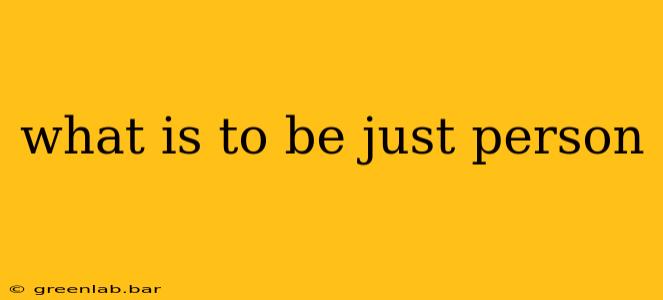Defining "just" is a journey spanning millennia, traversing philosophical debates and lived experiences. It's a concept that transcends simple rules, demanding a nuanced understanding of fairness, equality, and moral responsibility. This exploration delves into the multifaceted nature of justice, examining various perspectives and practical applications in our daily lives.
Understanding Justice: More Than Just Fairness
While often used interchangeably, fairness and justice aren't synonymous. Fairness focuses on equal treatment and distribution of resources, ensuring everyone receives their due. Justice, however, encompasses a broader scope. It's about upholding moral principles, rectifying wrongs, and ensuring societal well-being. A just person strives for both fairness and the upholding of a higher moral standard.
Key Pillars of Justice:
- Equity: Recognizing that equal treatment doesn't always lead to equal outcomes. Equity addresses systemic inequalities and disparities, ensuring everyone has the opportunity to thrive. A just person considers individual circumstances and strives for equitable solutions.
- Impartiality: The ability to make decisions without bias or prejudice. A just person weighs evidence objectively, avoiding personal feelings or preconceived notions.
- Accountability: Taking responsibility for one's actions and their consequences. This extends to holding others accountable for their behavior, advocating for justice and fairness within the system.
- Compassion: Understanding and empathizing with the suffering of others. A just person recognizes the humanity of all individuals, showing empathy and striving to alleviate suffering where possible.
- Integrity: Adhering to strong moral principles, even when faced with difficult choices. A just person maintains their moral compass, acting consistently and ethically.
Different Perspectives on Justice:
Philosophers throughout history have grappled with the concept of justice, offering diverse perspectives:
- Aristotle's Virtue Ethics: Focused on cultivating virtuous character traits, believing that just actions stem from a virtuous person. A just person, according to this view, acts justly because it's intrinsically good, not just to avoid punishment.
- John Rawls' Theory of Justice: Advocated for a "veil of ignorance," where individuals design a society without knowing their own position within it. This approach aims to create a system that is fair to everyone, regardless of their social standing or circumstances.
- Utilitarianism: Focuses on maximizing overall happiness and well-being. A just action, in this framework, is one that produces the greatest good for the greatest number of people.
Being Just in Everyday Life:
Justice isn't confined to courtrooms or political debates. It's a daily practice, demanding conscious effort and mindful choices:
- Challenging injustice: Speaking out against discrimination, inequality, and unfair practices.
- Empathetic listening: Understanding different perspectives and experiences, especially those marginalized or vulnerable.
- Advocating for others: Speaking up for those who cannot speak for themselves.
- Taking responsibility: Acknowledging mistakes and working to make amends.
- Promoting fairness: Striving for equitable solutions in personal and professional interactions.
Conclusion: The Ongoing Pursuit of Justice
Becoming a just person is an ongoing process, a continuous journey of self-reflection and ethical growth. It's about striving towards a more equitable and compassionate world, both in our personal interactions and within broader societal structures. It requires courage, empathy, and a commitment to upholding moral principles in the face of adversity. The pursuit of justice is a noble undertaking, demanding constant vigilance and a dedication to fairness, equality, and the betterment of humanity.

